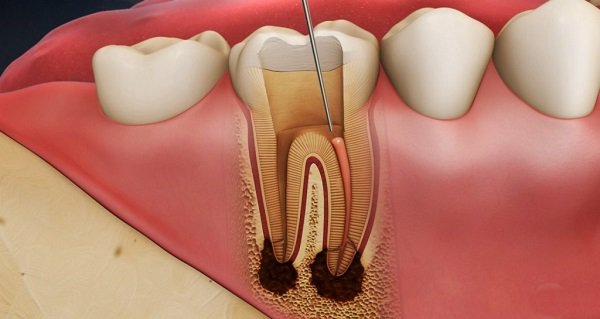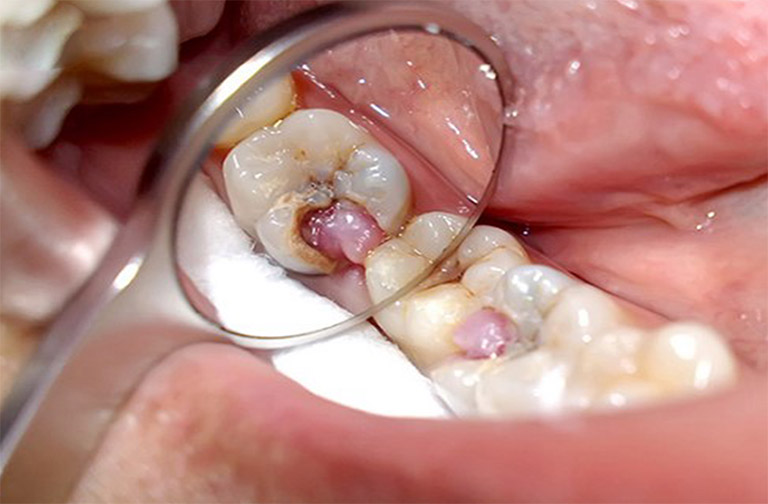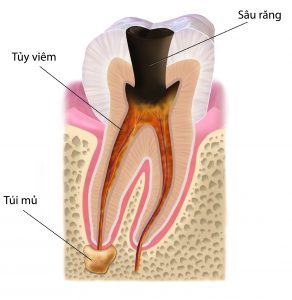Pulpitis, also known as Tooth pulp inflammation, can have potentially dangerous complications when left untreated. It occurs as a result of tooth decay, leading to inflammation that affects the central nervous system of the affected individual. Our mouths contain over 200 different nerve fibers, making them susceptible to pulpitis. In addition, this condition causes frequent toothaches, muscle spasms in the mouth, and difficulties with eating, drinking, and communication. Let's explore more about this topic in the following article.
What is pulpitis?
Before delving into pulpitis, it is important to understand some information and the functional role of dental pulp, as it will help grasp its significance. Simply put, dental pulp is the central part of the tooth that contains blood vessels and nerve tissues.
The soft tissues of the dental pulp are directly connected to our teeth through a small opening located at the root or neck of the tooth.
Pulpitis is a condition characterized by inflammation of the dental pulp. It commonly occurs as a result of bacterial infection or the accumulation of acidic plaque in the oral cavity, which can penetrate through pre-existing conditions such as gum disease or tooth decay. Additionally, there are other factors that can contribute to pulpitis, such as physical trauma or exposure to toxins like lead or mercury.
According to dental experts, pulpitis is considered as an inevitable consequence of the protective immune response and antibodies from the dental pulp against harmful agents.
Although pulpitis can be treated and the damage can be restored, if the disease progresses and the condition persists for a prolonged period, it can lead to acute pulpitis or chronic pulpitis.
Pulpitis can manifest in various forms, but it typically progresses through three main stages:
- Pre-pulpitis stage: This is considered the initial stage of pulpitis, where the inflammation of the dental pulp is mild, and occasional fleeting toothaches may occur.
- Acute pulpitis: At this stage, pulpitis transitions into more intense and severe toothaches, especially when the tooth is subjected to impact or comes into contact with hot or cold food and beverages.
- Chronic pulpitis: This stage is characterized by persistent and throbbing pain at the site of the inflamed tooth. Even slight movements can cause the nerve endings to ache.

The main causes of pulpitis
Pulpitis, in all its forms, originates from bacterial infection. Additionally, there are other factors that can contribute to the development of pulpitis, such as:
- Pre-existing untreated tooth decay: When dental caries are present but not promptly and properly treated, bacteria can infiltrate the dental pulp through cavities, leading to infection and inflammation.
- Tooth erosion or compromised outer layers: When the enamel or protective outer layers of the tooth are eroded or damaged, the tooth becomes more susceptible to chemical substances, acids, and bacterial attack.
- Physical trauma: Impact or injury to the tooth can cause damage to the blood vessels that supply the dental pulp, resulting in inflammation.
- Poor oral hygiene practices: Inadequate oral hygiene can contribute to the accumulation of bacteria and plaque, increasing the risk of pulpitis.
- Lack of regular dental check-ups: Failing to undergo regular dental examinations and seek advice from dentists and specialists can prevent early detection and timely intervention.
It is important to address these causes and maintain proper oral hygiene to minimize the risk of pulpitis. Regular dental visits and prompt treatment of dental issues are crucial for preventing and managing pulpitis effectively.

Why should you treat pulpitis when symptoms are detected?
Pulpitis is a condition where tooth decay has progressed significantly and cannot self-recover. Therefore, when you experience symptoms of pulpitis as described above, it is important to promptly contact your dentist for treatment.
>> See more: Are tooth decay symptoms in children dangerous and how to treat?
How to effectively and appropriately treat pulpitis?
The best advice from leading dentists today is not to underestimate pulpitis, regardless of the underlying cause or severity. Pulpitis can easily spread from inflamed areas to surrounding teeth. It is essential to take preventive measures and seek timely treatment.
Avoid being overly complacent and neglecting preventive measures or timely treatment. Instead, visit a dental clinic for an examination as soon as you experience any signs of toothache.
Champion Dental Clinic takes pride in its professional and experienced team of dentists, equipped with state-of-the-art dental facilities capable of handling any case of pulpitis, no matter how challenging. We aim to provide our valued customers with strong and healthy teeth and a confident smile.

Contact Champion Dental Clinic for the best advice and examination.
Vietnamese & English: (028) 5411-2295
中文: (028) 5411-2297 172 Nguyen Luong Bang, Tan Phu Ward, District 7, Ho Chi Minh City.
Fanpage: Champion Dental Clinic 牙科診所
Zalo: Champion Dental Clinic
Youtube: Champion Dental Clinic 牙科診所
 Champion Dental Clinic
Champion Dental Clinic



